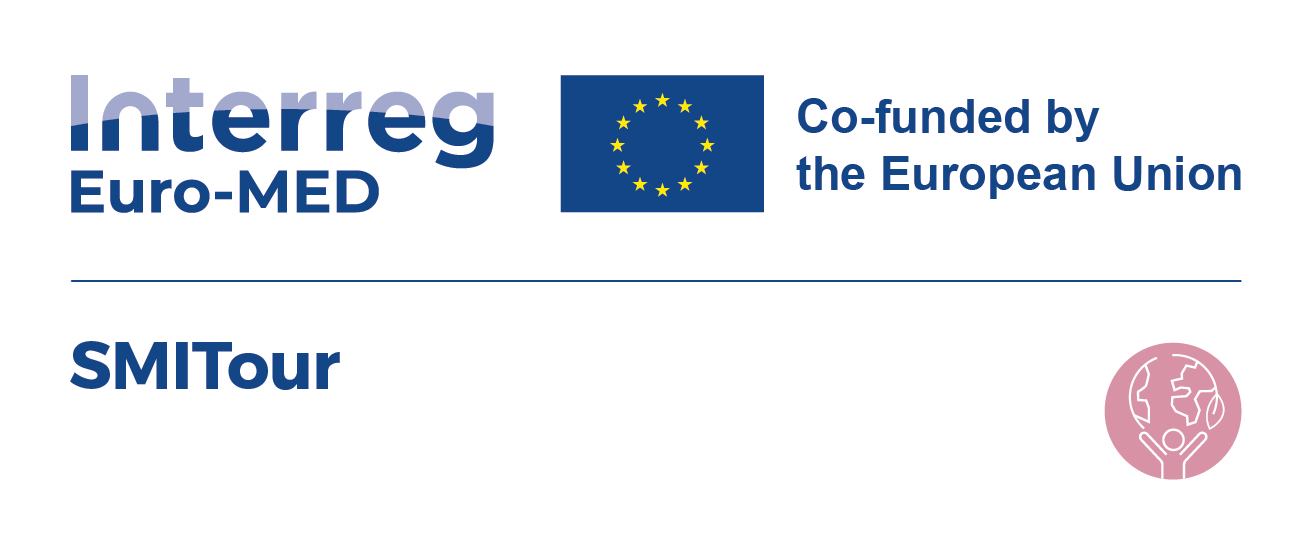The project aims to exploit transnational cooperation to explore the social and economic potential of Smart Industrial Tourism (SMIT), as a sustainable economic activity that can benefit tourism actors, SMEs, the industry, CCIs, R&D centers, HEIs and technology providers, and the local communities.
The project will create transnational working groups involving 4helix stakeholders to explore industrial tourism and related advanced technologies applications. It will eventually define a common strategy and Action Plan for the development of SMIT in the Med regions. The result will be a diversification of the economy and of the sector, a reduction of over-tourism and seasonalization, and a boost to social and economic growth and to technological innovation of tourism at large.
Before COVID-19, tourism accounted for about 15% of Med countries GDP and 11.5% of their total employment. With the lockdown and travel restrictions the pandemic totally disrupted the sector. Now that the pandemic is subsiding and the sector is recovering, a new risk has arisen, that old unsustainable tourism patterns are re-proposed, generating undesired effects like over-tourism and seasonalization, with their unbearable pressure on the environment and the communities.
The challenge in the post-pandemic time is to change tourism, by e.g. focusing on alternative destinations and by exploiting technology (particularly those that have been boosted by the pandemic) to make the tourist experience more rewarding and yet more sustainable.
Many Med regions and cities with important industrial sites are considering Industrial Tourism as a way to attract tourists to their areas. On the other hand, the common-place visit to productive sites could be greatly enhanced by integrating additional cultural and historical elements through the use of advanced and immersive technologies that can make the experience more informative and enticing for the visitor (Smart Industrial Tourism).
The project will create transnational working groups involving 4helix stakeholders to explore industrial tourism and related advanced technologies applications. It will eventually define a common strategy and Action Plan for the development of SMIT in the Med regions. The result will be a diversification of the economy and of the sector, a reduction of over-tourism and seasonalization, and a boost to social and economic growth and to technological innovation of tourism at large.
This project has the potential to significantly contribute to the academic understanding of Smart Industrial Tourism (SMIT) by employing a transnational, 4-helix stakeholder approach. By bringing together tourism actors, SMEs, industry experts, Chambers of Commerce and Industry (CCIs), Research and Development centers (R&D), Higher Education Institutions (HEIs), and technology providers, the project will create a unique environment for knowledge exchange and collaborative research. This collaborative approach can lead to advancements in SMIT best practices, the integration of advanced technologies, and the development of effective strategies for sustainable economic development in the Mediterranean regions.
This project explores Smart Industrial Tourism as a sustainable economic driver for the Mediterranean and involves diverse stakeholders to develop innovative solutions and collaboration between partners. The expected outcome is a more diversified, year-round industrial tourism sub-sector, with enhanced potential to attract visitors and create new jobs while reducing pressure on popular destinations. As a consequence, the project will stimulate economic growth across industries, from SMEs to technology providers, while benefiting local communities
| Research Centre | Research Group | Role in Project | Begin Date | End Date |
|---|---|---|---|---|
| BRU-Iscte | Management Research Group | Partner | 2024-01-01 | 2026-03-31 |
| BRU-Iscte | Marketing Group | Partner | 2024-01-01 | 2026-03-31 |
| Institution | Country | Role in Project | Begin Date | End Date |
|---|---|---|---|---|
| Municipality of Prato (Prato) | Italy | Leader | 2024-01-01 | 2026-03-31 |
| Xarxa de Turisme Industrial de Catalunya (XATIC) | Spain | Partner | 2024-01-01 | 2026-03-31 |
| Prato Textile Museum Foundation (MDT) | Italy | Partner | 2024-01-01 | 2026-03-31 |
| Hellenic Clothing Industry Association (HCIA) | Greece | Partner | 2024-01-01 | 2026-03-31 |
| E-institute (eZAVOD) | Slovenia | Partner | 2024-01-01 | 2026-03-31 |
| Faculty of Economics and Business Rijeka (EFRI) | Croatia | Partner | 2024-01-01 | 2026-03-31 |
| Name | Affiliation | Role in Project | Begin Date | End Date |
|---|---|---|---|---|
| Álvaro Dias | Professor Associado (com Agregação) (DMOG); Integrated Researcher (BRU-Iscte); | Local Coordinator | 2024-01-01 | 2026-03-31 |
| Maria José Sousa | Professora Associada (com Agregação) (DCPPP); Integrated Researcher (BRU-Iscte); | Local Coordinator | 2024-01-01 | 2026-03-31 |
| Jorge Nascimento | Integrated Researcher (BRU-Iscte); | Researcher | 2024-01-01 | 2026-03-31 |
| Reference/Code | Funding DOI | Funding Type | Funding Program | Funding Amount (Global) | Funding Amount (Local) | Begin Date | End Date |
|---|---|---|---|---|---|---|---|
| Euro-MED0200368 | -- | Contract | European Comission - INTERREG Euro-MED | 600000 | 80000 | 2024-01-01 | 2026-03-31 |
No records found.
No records found.
| Title | News Media Entity | Type | Publication Date |
|---|---|---|---|
| Empreendedorismo de Estilo de Vida" no Centro Cultural | website | News | 2025-05-20 |
| 90 Segundos de Ciência - Alvaro Dias | RTP | Interview | 2025-04-03 |
No records found.
No records found.
With the objective to increase the research activity directed towards the achievement of the United Nations 2030 Sustainable Development Goals, the possibility of associating scientific projects with the Sustainable Development Goals is now available in Ciência_Iscte. These are the Sustainable Development Goals identified for this project. For more detailed information on the Sustainable Development Goals, click here.

 Português
Português




